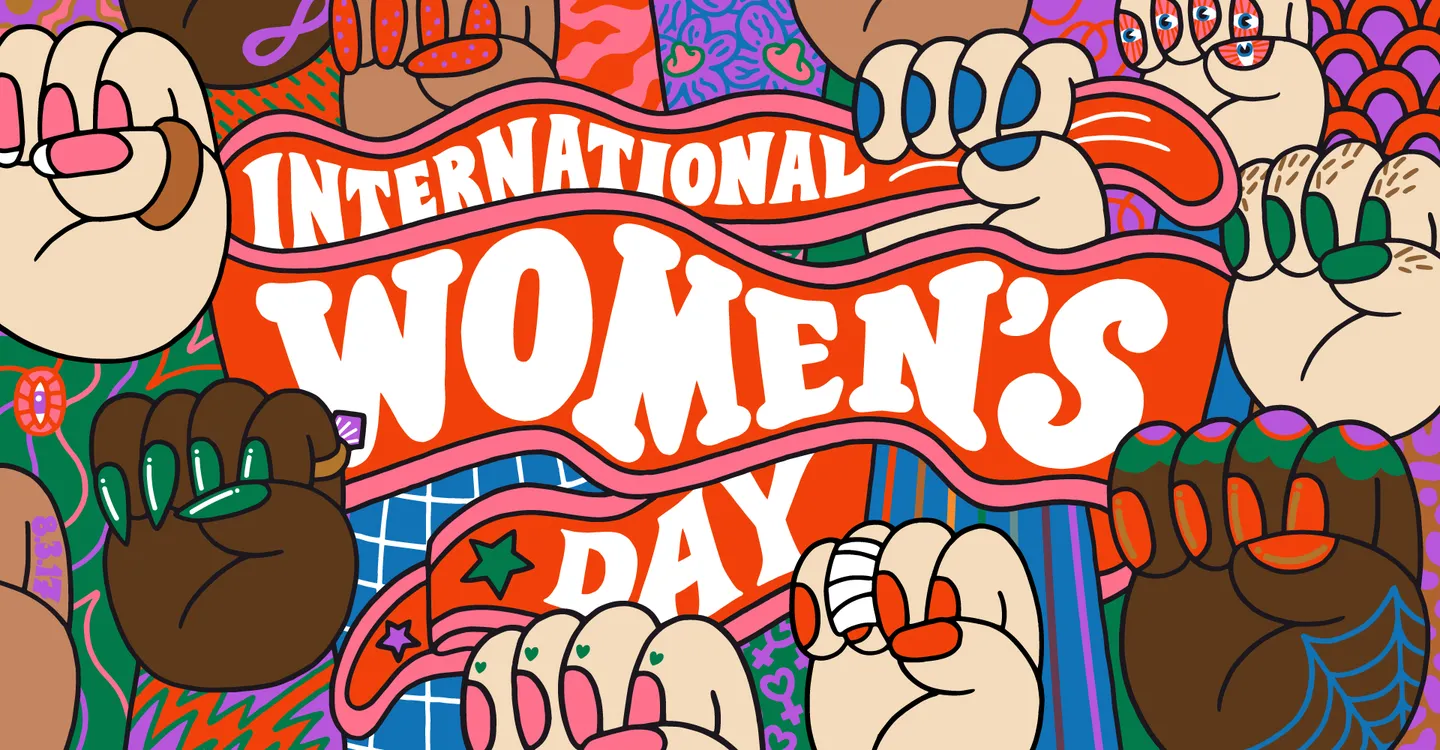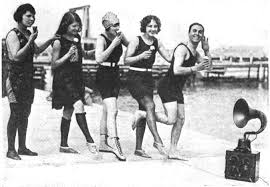I’m a Woman With Nothing to Prove
It astounds me the lack of privileges women had in the past. Over 100 years ago, the 19th amendment passed,“ The right of citizens of the United States to vote shall not be denied or abridged by the United States or by any State on account of sex.” Sadly, women still battle with discrimination to this day. For example, think about the wage gap between men and women. Men typically are paid more than women in work settings. It’s crazy that 100 years have passed since the 19th amendment; yet, there has never been a female president. It makes me wonder, do people think women are not able to lead a country? One of the hardest challenges of being a woman is having to continue to prove yourself.
Illustration by Kate Prior
I am thankful for the brave women that never stopped fighting for women’s suffrage. I think that as a society, we have made impressive strides with reaching equality. I can’t imagine not being able to exercise my right to vote or even doing a task as simple as opening my bank account. I think about all the things I wouldn’t be able to do that are now apart of my identity. For instance, I wouldn’t even be able to receive a college education. It’s opportunities we don’t think about every day, but I will never take them for granted. I’m proud of the strong and powerful woman I am today.
Ladies, let’s continue to stand together and support one another.
Remember that you don’t have to prove yourself to anyone.
Lastly, Happy (early) International Women’s Day!
Unapologetically Black
At this point in my life, I feel like I no longer have to be who and what society and the people around me think I should be. It’s a relief not feel like I have to be the right type of black for people to pay attention to me or appreciate my work. I’m tired of having to prove myself to people by portraying myself as something I’m not.
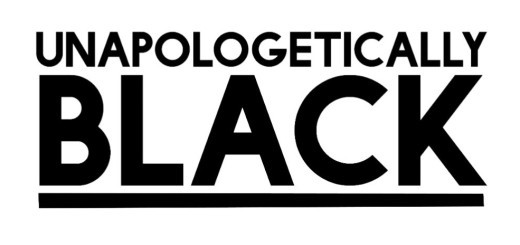
Being black and not using slang in every sentence; knowing who my father is, not being loud and confrontational at any given moment, tends to deliver a shock to some people’s systems. People are extremely puzzled about how I managed to graduate high school and go to college. Or the fact that I don’t have any children or that I’ve never been arrested or any other stereotypical ideology that you can place on a black person. This then earns me a great job but in reality, it’s really “Good job on not being another statistic.”I despise that.
In an attempt to prove I was not another stereotype, I started losing who I was and became apologetic for being me. I couldn’t engage in conversation about race, because while broaching the subject I would have to pick and choose my words carefully because from what I had learned from the world you don’t want to make people uncomfortable talking about these very real and true subjects. Having to tone myself down to not listening to the type of music I like, how I wore my hair or even what I ate. Going to a PWI (predominantly white institute) while losing the essence of who I am was exhausting. Because once again I had to conform to what at the time I thought was acceptable.
Fortunately, for me, the moment I decide for myself that I could no longer conform to fit in came when I lost a friendship. I didn’t recognize it at the time, but I had become what they considered an acceptable black person. The friendship ended over me being painted as an aggressive angry person because I wouldn’t admit to something that I didn’t do. I was made to feel like I was wrong and that I needed to apologize to hold on to them. It was the time I spent alone that I was able to begin to know myself again. It was in those times that I realized I’m a strong, opinionated person. I shouldn’t have to alter my identity to fit in, to be accepted or even to be successful.
My message today would be if someone stereotypes you for being who you are, who cares? Don’t transform the person you are to fit the mold of what society thinks is an acceptable black person. Don’t alter your hair for anyone but you, don’t become meek and docile because you fear being labeled angry and aggressive. Stand up for what you believe in, have those uncomfortable conversations. Take pride in your accomplishments and who you are.
Don’t look for validation and worth from a few ignorant people.
Please relieve yourself of that burden.
Be black and be you.
Opening My Eyes
I grew up in a rural Missouri town where diversity was lacking. The population was mostly white, conservative, church-going folk. Often times growing up it was tough to put myself in others’ shoes when thinking about critical issues. Anything from racial injustice to gay rights to the living conditions in other countries. It was like I had on blinders. I was living in my own world where I was okay, so that meant that everything must be okay.

This all changed soon after I graduated high school and moved on to college. The atmosphere in which I was in everyday changed drastically as I found myself reaching out to more and more people who were very much different than me. I began to use Instagram to meet the creative people of Kansas City and many of them are a different race or sexual orientation from myself. As I got closer to these people my mind was opened up to the injustices that real people have to deal with.
I never knew how much other people care about certain social and political issues until I started caring for the people that these injustices affected. As I’ve grown since high school I feel completely removed of the blinders that separated me from the real issues of the world. This helps me be more informed as a person to make good voting decisions and to help when I can.
Exercising your right to vote can truly change the lives of millions of people. Putting the right person in office has the potential to change the climate in America for under-represented people of America. Education and experience with real people drive my desire to pay attention to critical issues facing this country.
The “Golden Rule” still applies and is probably more true now, than ever, “treat others how you wanted to be treated.”
Acknowledging my White Privilege
It isn’t particularly groundbreaking for a white person to acknowledge the privilege that comes with being white. Peggy McIntosh wrote “Unpacking the Invisible Knapsack” in 1989, when I was two. Even so, I’d not really thought about my own privilege for most of my life. I’d heard of it, and I never challenged it existed. It made sense, given documented history, that challenges existed for people of color that just didn’t exist for white people – for me. But it wasn’t easy to see, and so I didn’t see it, especially when things were difficult for me in spite of the advantages I didn’t realize I had.
1989 was 30 years ago, and it’s important to acknowledge white privilege is still a privilege. I have never been stopped while walking into a friend’s residence because there’s been trouble in the past with robberies. I have never had to give a report to an on-duty police officer for having a barbecue at a lake. I’ve never had the police called on me because I was on a tour of a college campus. There’s never been a time I was watching someone’s kids and the police showed up to perform a wellness check. I have not once been asked why I’m in the United States while participating in a school meeting. I’ve never thought about driving an older, simpler vehicle than I can afford just to avoid getting pulled over.
I am able to tell my daughter that if she studies hard and works hard, she’ll have an opportunity to do anything she wants, and I don’t have to hope that by the time she wants to pursue her dreams in earnest, enough time will have passed that the invisible asterisk attached to that statement will have dropped off.
And after I’m done writing this, I will probably continue to take for granted what the color of my skin affords me, because I’ve never experienced anything else.
Men’s Mental Health (Guest Blogger: Kamran Sheriff)
Kamran Sheriff is a senior the University of Central Missouri. He will be graduating in May with a degree in Digital Media Production and an emphasis in digital cinema. he currently works as an office assistant in one of the dorms at his college and is currently working with the music department to create videos and online content. He is passionate about directing, filming, editing, and designing whenever he gets the chance to do so.
#####
In today’s society, there is a stigma surrounding the mental health of men. For a long time there has been this need to push the idea that men are supposed to represent something of a dominant and apex symbol for their gender. This expectation that we push on men has been overused and in all honesty has gotten ridiculous as of recently, along with the people who still believe this to be true.

Photo by Flora Westbrook on Pexels.com
Mental health is something that a lot of people don’t want to touch on as some see it more as a personal issue and that the individual lacks to fortitude of keeping their emotions in check. It is incredibly damaging that we need to keep pressuring men that they need to fend for themselves instead of reaching out to others to seek help.
In an article titled “Why Many Men Have a Harder Time Seeking Treatment For Mental Illness” by Leah Campbell, she points out that “Depression and suicide are ranked as a leading death among men, and yet they’re still far less likely to seek mental health treatment than women” (Campbell). I think it is important that men are able to acknowledge that it’s okay to seek help when they know that it is right for them, instead of bottling up their emotions and potentially creating bigger problem for themselves.
Do you think we need to end this stigma in men? Do you think that this is a generational thing and that we should start abolishing these images of what men should be to society?
World Day of Social Justice (Guest Blogger: Alexis Ceja)
Alexis Ceja is a senior at the University of Central Missouri. She will be graduating in December with a degree in Digital Media Production and an emphasis in audio, and a minor in communications. Alexis currently works with KD The Photographer and The Dream 816 as their Social Media / Visual Content Coordinator. She is passionate about creative directing, and loves being behind the camera or in the studio.
#####
Did you know there was a such thing as World Day of Social Justice?
The big day has been observed globally since February 20, 2009. This day is to raise awareness about social injustice done throughout the world and to promote solutions/improvements. Some of the social developments are aimed at social justice, solidarity, harmony, and equality among and within countries. 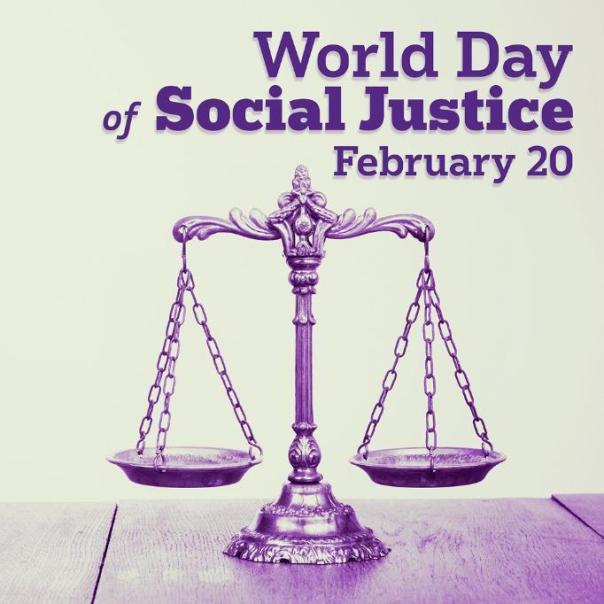
Social Justice observers are encouraged to raise their voice against social injustice and promote social justice to bring various communities internationally together. One of the main goals is to eliminate poverty, gender and physical discrimination, illiteracy, religious discrimination, etc. to make a socially integrated society. This day is not to be celebrated as a holiday, but more to be observed as day for protestors peacefully fighting against injustice.
Social justice is an important principle for any possibility of peaceful and prosperous coexistence within/among nations. The theme for 2019 is ‘If you want Peace and Development, Work for Social Justice’ how would you like to see this theme captured? How about a film, or artwork, what about poetry?
Mark your calendars for February 20, 2020 and show your support/awareness for social justice around the world. Don’t just wait for February, use your voice to fight against all social injustice creating barriers for peace TODAY.
Social Justice in Sports
Andrew Griggs is a senior at the University of Central Missouri. He will graduate in December 2019 with a Bachelor of Science in Digital Media Production with an emphasis in Radio. He currently works for Prepcasts LLC as a play by play commentator He has started his own channel on the broadcasts by signing Sweet Springs athletics to a one year contract with Prepcasts LLC.
#####
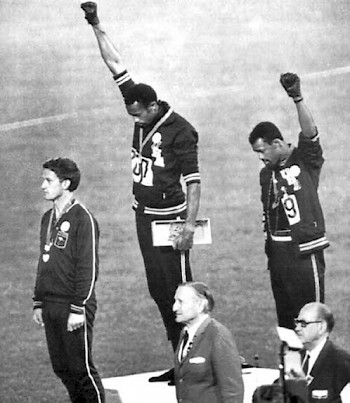
Seeking equality in sports dates back to 1963 with the march on Washington. Bill Russell participated one the march and conducted integrated basketball clinics in Jackson, Mississippi and was an outspoken activist of segregation. USA track and field athletes Tommie Smith and John Carlos raised a gloved fist to support and represent the civil rights movement during the struggling time for equality, to honor the death of Dr. Matin Luther King Jr. and Senator Robert Kennedy. In 2016 the death of Muhammad Ali reignited the time of when black men had to fight for their country while being denied civility and civil rights at home. Ali’s refusal to serve in the Vietnam War became a defining historical moment for the Black athlete-advocate. Colin Kaepernick’s taking a knee during the national anthem represent some of the modern ways Black athletes have used their respective platforms in sport to draw attention to the cultural illusion of meritocracy in America Despite this, their courage and resilience opened doors for Black athletes to speak out against social injustice today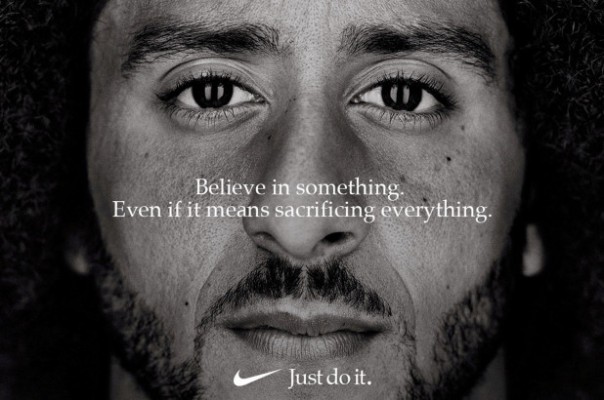
What are some of the things you have seen athletes use to draw attention to their beliefs of social justice in sports?
Sports And Social Justice Expert Speaks About NCAA Legislation – (Guest Editor: Evan Holmes)
Evan Holmes is a senior at the University of Central Missouri. He will graduate in May 2020 with a degree in Digital Media Production with a minor degree in Sports Communication. He currently works as a color commentator for high school football on The Prepcast Broadcasting Network. Evan will also be commentating high school basketball for Warrensburg High School in Warrensburg, Missouri. Evan also enjoys music, editing videos, and being with his friends in his spare time.
#####
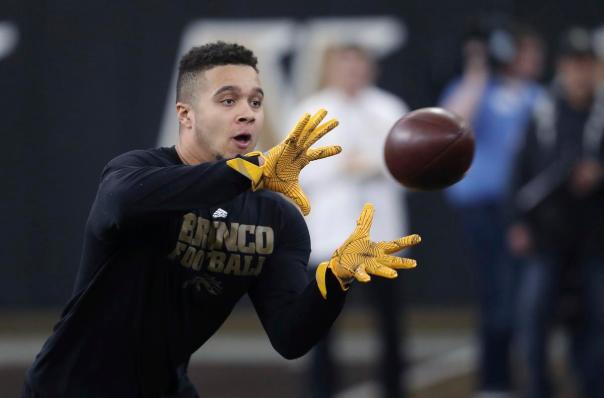
There has been a question in college sports that has sparked debates for many years. The question is, should NCAA athletes be able to make money while playing their respective sport while they’re still in college? In October of 2019, the NCAA Board of Governors answered the question by voting to allow athletes to benefit from the use of their name and image. The board says that they would like to put these new rules and regulations into place by January of 2021. But there is one person who has a different idea on the matter.
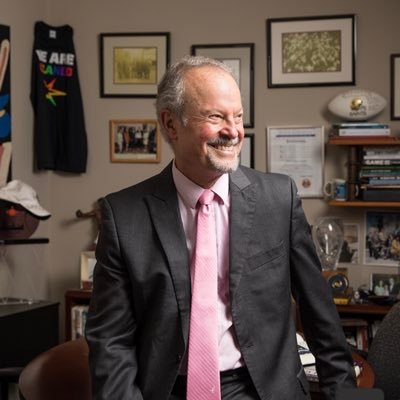
Richard Lapchick is president of the Institute for Sports and Social Justice at the University of Central Florida. Lapchick is no stranger when it comes to dealing with social justice when it appears to him in the form of sports. At an early age, Lapchick learned about issues of race and sports. His father Joe Lapchick coached the New York Knicks in the NBA. He signed one the NBA’s first African-American players Nat “Sweetwater” Clifton in 1950. Richard Lapchick says he remember seeing his father hang in effigy from a tree. He also heard the N-word for the first time on the phone at his house.
Richard Lapchick was attacked himself over his efforts to lead sports boycotts against South Africa during the apartheid era. Late one night at his office at Virginia Wesleyan College, Lapchick was assaulted by two men who carved the N-word into his stomach with a pair of scissors. Lapchick says “In the hospital that night I knew I was going to spend the rest of my life using the sports platform to address social justice issues.”
Lapchick says the NCAA is reacting to legislation in California and other states.
“The colleges themselves have made money off using the likeness of their athletes, and I think fairness here is that those athletes should get it as well.”
Lapchick says while he thinks it’s fair for athletes to make money off their name or image, he’s not in favor of schools paying athletes directly:
“If they get a real education and a genuine degree from the university, that’s a fair trade for the use of their talents on the field.”
What do you think? Do you agree with Lapchick’s views on paying college athletes? Why or why not?
Child Fighting In Thailand – (Guest Blogger: Tim Griddine)
Tim Griddine is a senior at the University of Central Missouri. He will graduate in December of 2019 with a degree in Digital Media Production with a focus in audio. He currently works as an audio/video technician for the University of Central Missouri. He also enjoys recording and engineering music in his free time.
#####
Muay Thai, also known as “the art of eight limbs,” is a several hundred-year-old form of kickboxing that works to utilize the entire body as a weapon. A wide variety of punches, elbow strikes, knees, kicks, and foot thrusts are used in each bout. Many are asking, should children be subjected to the bruises, kicks, and head punches that come with it?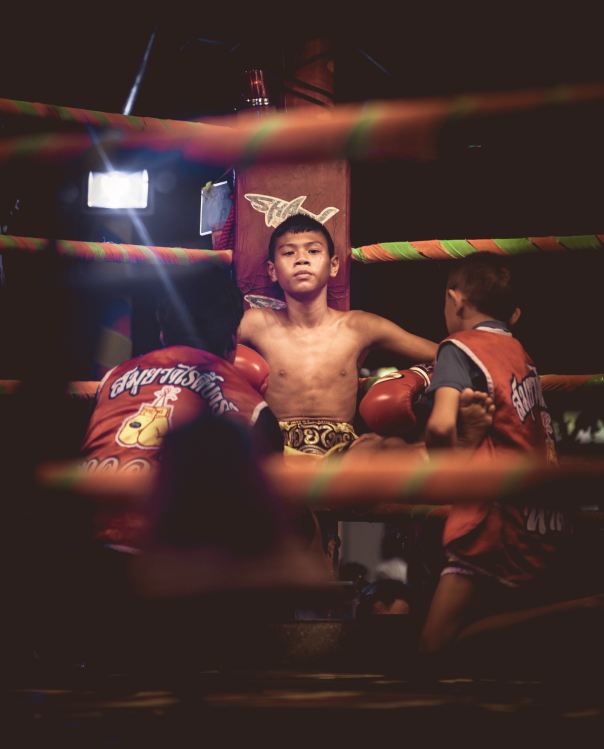 Photo by Gareth Harrison on Unsplash
Photo by Gareth Harrison on Unsplash
In November of 2018, Anucha Tasako, a 13-year-old boy, steps into a ring to fight another boy for the equivalent of 60 U.S. dollars. In the video, Tasako is seen knocked to the ground multiple times before he is knocked out with a delayed stoppage by the referee. Two days later, Anucha died in a hospital due to a brain hemorrhage. Prior to his death, he had fought 174 bouts since the age of 8. Does this high number of fights sound bizarre? Well it’s actually quite normal. You see in Thailand, young fighters do not make much money, and they often must fight multiple times during a week, or even during a single day. As you can imagine, these numbers can quickly add up.
In Thailand, Muay Thai is the national sport. Children start training as early as 6 years old. according to an article on nytimes.com there are around 200,000 kids in Thailand under the age of 15 who compete regularly. For many, the sport is a ticket out of poverty, for others, it is a ticket to international fame. In Thailand, doctors have been saying for years that Muay Thai is dangerous for kids, but unfortunately people tend to ignore the specifics until something bad happens. Many local politicians and doctors have been pushing for new laws that protect kids from child fighting, yet fans disagree, and change remains slow. What will it take for new laws to be made that protect the young from fighting? What are your thoughts?
Guest Blogger – Dan Harbaugh – “Credit Where Credit is Due”
Dan Harbaugh is a senior at the University of Central Missouri. He will graduate in 2020 with a degree in digital media production with a focus in audio. He loves recording and contributing his efforts to interesting soundscapes and audio experiences. He also is a professional voice actor, and enjoys a good bit of art in his free time. Something that some people don’t fully understand the rules for –
#####
Artists work hard on what they make. This isn’t your everyday doodle kind of art, but artwork that takes time to develop and master. With the rise of digital art online, one can expect some funny business to occur to say the least. What I’m talking about it a form of art theft. Basically put, it’s when a person posts artwork that doesn’t belong to them and doesn’t credit the original artist in any way. This was the story for Tesla’s CEO, Elon Musk, a few months back.
This was the original work that Elon Musk “refused” to credit. The story goes that the billionaire tweeted just the image with the text “2B” [a character from the NieR:Automata series] and left it at that. When asked about why he didn’t credit the artist, he stated, “any fool can find out who the artist was in seconds.” and then went on to say that doing so is whats destroying the medium. Funny enough, these tweets were deleted later.
This issue continues to happen online and its negatively affecting artists. Not crediting the artist is what destroys an artists brand and makes it undeniably difficult for them to be recognized for their work. Any form of art theft damages not only the mentality for sharing art online, but it further scares new artist from sharing their creativity as well. This, if anything, can be a reminder to give credit where credit is due. Ask permission, or at the very least give some indication that the art belongs to someone else – and I guarantee if there is no link to the artist, someone will notice and let you know.
